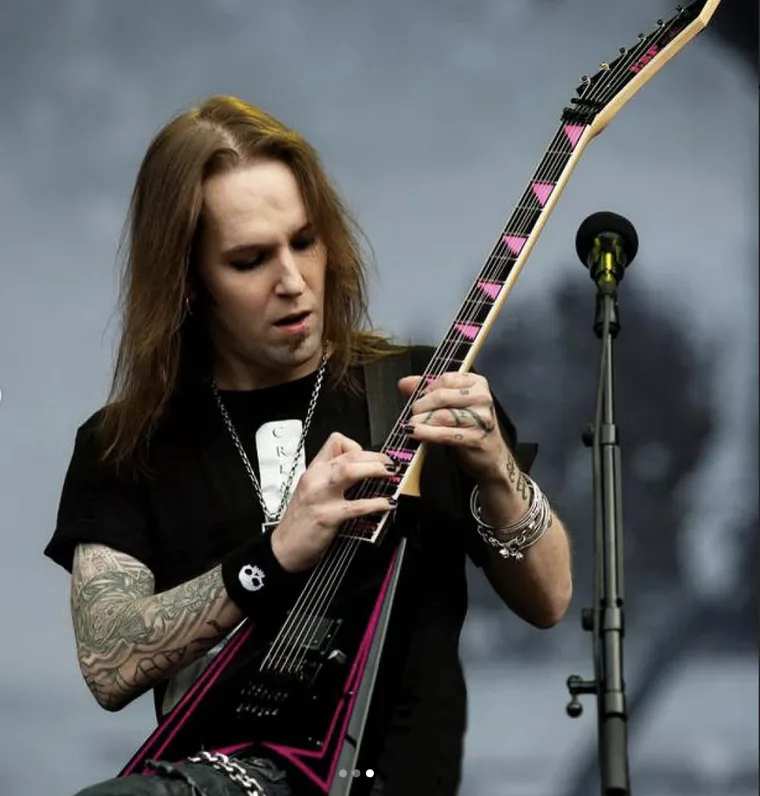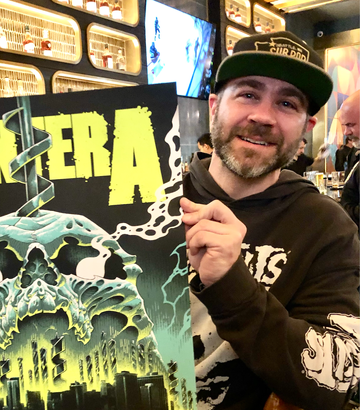“It sounds like Zakk Wylde, but better.” – Zakk Wylde
This is the way that Zakk Wylde, Ozzy Osbourne’s axeman for decades and widely regarded as one of the best metal guitarists in the world, characterized the playing of Finnish guitar hero Alexi Laiho. If you don’t come from a metal background, or if you haven’t had a conversation with me in the last two weeks, there’s a good chance that you’re largely unfamiliar with Alexi’s work. But inside the metal community, Laiho’s catalog of crushing riffs, innovative compositions, and blistering solos is the stuff of legends.
With his parents’ blessing, Laiho quit traditional schooling at the age of 15 to focus on the one thing he was unconditionally passionate about – playing the electric guitar. His band, Children of Bodom, released their first album Something Wild before Alexi had a driver’s license. Using a knowledge of composition and music theory that he learned at the Pop and Jazz Conservatory in Helsinki, Children of Bodom created a blend of death, thrash, and black metal with neoclassical influences that catapulted them to international renown after their first three releases. The record executives who first signed them noted that they had taken the current movement towards melodic death metal one step further, creating the unique blend of the three genres mentioned above that separated them from their brethren through Alexi’s incredible, blazing guitar work complemented by Janne Wirman’s equally impressive keyboard shredding.

As lead guitarist, lead vocalist, and primary songwriter, most of the accolades the band garnered were attributed to Laiho. At 23, he had secured a sponsorship deal with ESP guitars after his Jacksons were stolen from him. Right around his 26th birthday in April 2005, he was featured on the cover of Guitar World's Virtuoso Issue with Steve Vai and Zakk Wylde, two of his biggest influences in the music world. Shortly before that issue was released, when asked who the best guitarist in the world was by Rolling Stone, Kirk Hammett of Metallica, one of Laiho’s favorite bands, responded “I would say it's the one and only Joe Satriani or that kid Alexi! What a power he has!"
Children of Bodom would encounter another set of their frontman’s idols when they opened for Slayer in 2006 on the Unholy Alliance North American Tour. After receiving a personal phone call from Dave Mustaine, the group would do the same for Megadeth in 2008. Laiho was voted as best metal guitarist in 2009 in a poll of Guitar World readers by a large margin right after turning 30. Bodom would open for Metallica for their shows in Finland in 2014, a thrill for Laiho who learned all of Kill Em All back in the conservatory after a classmate had bragged to him about learning all of Appetite for Destruction a short time prior. Around the time he turned 36, he wrote and performed a commissioned piece in Senate Square in Helsinki, aptly named “100 Guitars from HEL” in which 100 guitarists from around the world joined him on stage during the prestigious Helsinki Festival in 2015.

But by the time he was set to turn 40, his longtime friends and bandmates in Children of Bodom would be deciding how to leave the group and amicably split with Alexi. And by the time he turned 41, Alexi would only have 8 more months to live. He would never see his 42nd birthday.
The story of Alexi Laiho should be a triumphant one. A young Finnish kid enamored by ‘80s thrash bands like W.A.S.P. (from where he adopted his “Wildchild” moniker), Metallica, Slayer, and the like puts all of his efforts into becoming the next guitar hero – and succeeds beyond perhaps his own wildest dreams. This story should have a happy ending. But it doesn’t. And the question from fans from all over the world, including myself who first encountered the mind boggling sounds produced by Children of Bodom in those late 1990s days of Napster and metal message boards, is a simple one: Why?
In order to gain a deeper understanding of who Alexi Laiho was, I took a look at a number of sources to seek the answers I’ve recently become obsessed with knowing. Through looking at Alexi’s own words about his life in his 2019 autobiography Chaos, Control & Guitar, interviews with those closest to him, and his bandmates descriptions of their time with him, I have tried to make sense of the decisions he made that ultimately led to his downfall. His lyrics, though sometimes indecipherable even to the black metal trained ear and usually an afterthought when compared to the brilliant compositions they were sung over, actually do illuminate his inner most thoughts as well. Alexi called himself a “so-called singer” and downplayed any deep meaning to be found in lyrics, but when analyzed as prose alongside what we know about his life, they do actually give insight into their writer’s grim mindset. What follows here, to the best of my reasoning, is what led this brilliant, genius guitarist and composer towards his tragic and untimely death.
“The razor caressed my flesh
And my arms turned red, I feel a vast desire
Years of pain are flowing down my arms.” – “Bed of Razors,” Hatebreeder (1999)
For the most part, Alexi had a rosy view of the world as a child, calling it by far the best time of his life. His parents took note of and fostered his interests, agreeing to allow him to pursue his passion for guitar by buying him one at age 11, and after a long conversation around age 13, letting him end traditional schooling after he had fulfilled the basic requirements to solely focus on music. Around the same time of this conversation, Alexi formed his first band with Jaska Raitikannen, his childhood friend, on drums. Initially known as IneartheD, the group started to produce demo material through what would have been Alexi’s high school years that would eventually lead to Children of Bodom securing their first recording contract ahead of recording and releasing Something Wild.
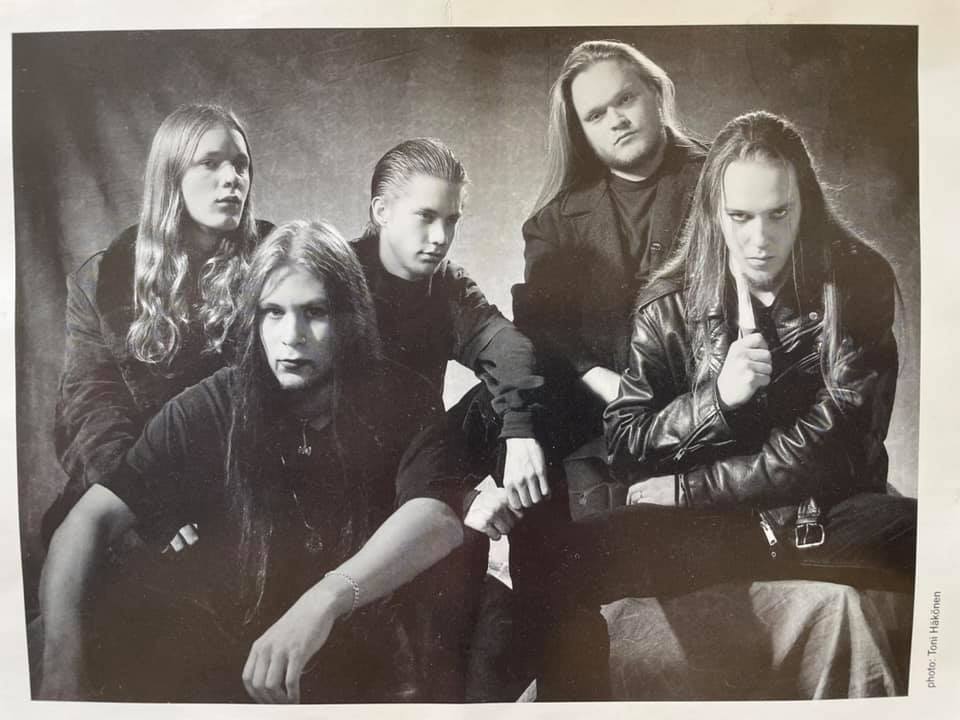
In between that demo stage in the mid-90s and the album’s release in 1997, however, Alexi would go through a rather traumatic experience that influenced his world view moving forward. According to his own account of the events, “a couple of maniac speed freaks” began stalking him due to what he called a “preposterous jealousy issue concerning one of my girlfriends.” The situation escalated to the point where these two people held Alexi with a knife to his throat and threatened to kill him. Another situation was resolved by Laiho calling a family member to come to his rescue by showing his grandfather’s firearm to de-escalate the situation. His two tormentors would pass along messages through mutual acquaintances to threaten Alexi throughout this time period as well.
Feeling unsafe in his hometown of Espoo, he moved away from his parents’ home to Helsinki. He would sometimes stay with his sister, Anna, and at other times, would sleep around with older women in order to find a place to stay for the night. Without a car or driver’s license, he felt threatened walking around his hometown without an easy method of escape. He described this period of his life as filled with “anxiety, agony, dread, and unending uncertainty.” Still at the tail end of adolescence, it’s important to note the habits Alexi developed in response to these emotions. In his own words:
Suffice it to say that I had no capacity, means, or tools to put any of this into any kind of perspective, or even deal with it in a reasonable way. But crying in a corner or indulging in self-pity has never been my thing, so I put it all into music. You either learn to live with shit like this or you don’t. Sometimes it took a few beers to get to the end of the day, sometimes a little vodka… Self-harm was a reaction to the events that made me leave Espoo….some people calm their nerves by taking cigarette breaks. My method was more drastic. Self-mutilation with a knife became a routine ritual for me for a while.
There are three key coping mechanisms that emerge from those feelings brought on from this ongoing stalking situation. The first is that Laiho starts to self-medicate through the use of alcohol, which for those familiar with the story, should come as no surprise. The second is self-harm, with a butterfly knife, which became very routine for Alexi during the early years of Children of Bodom, so much so that he recalls a specific spot, that once he got his driver’s license, he would pull off the road for the ritual when returning home from a girlfriend’s house. The last is the channeling of his emotions into his music and obsessively engrossing himself in it, ideally to work through them but perhaps, ultimately to avoid dealing with them in real life. These are three themes that would recur throughout the rest of his life, though some more than others.
“The flame is dying by shivery winds of jet black skies
It reflects hatred in my eyes I see angels burning, falling down in ruins
Looking down I see my ashes scattered around my grave Angels whispering fire, no longer I'm alive
Settled down I'm done with the trip to my kingdom come” – “Downfall,” Hatebreeder (1999)
In the years since it happened, Alexi called securing a recording contract one of the best moments in his career, a rare moment of happiness during a period of time that was so anxiety-inducing for him given the predicament described above. On the back on Something Wild, Children of Bodom were able to secure an opening spot for Dimmu Borgir for a 1997 Halloween show in Helsinki, which Laiho called their “first important show.” Silenoz, guitarist for the headlining band recalled the first time he heard Alexi play guitar:
We could hear the opening band playing from backstage… We were like, ‘Holy shit, what is this?’ It sounded like Yngwie Malmsteen on speed. We ran out and watched the spectacle and stood there with our jaws open… - Louder Sound
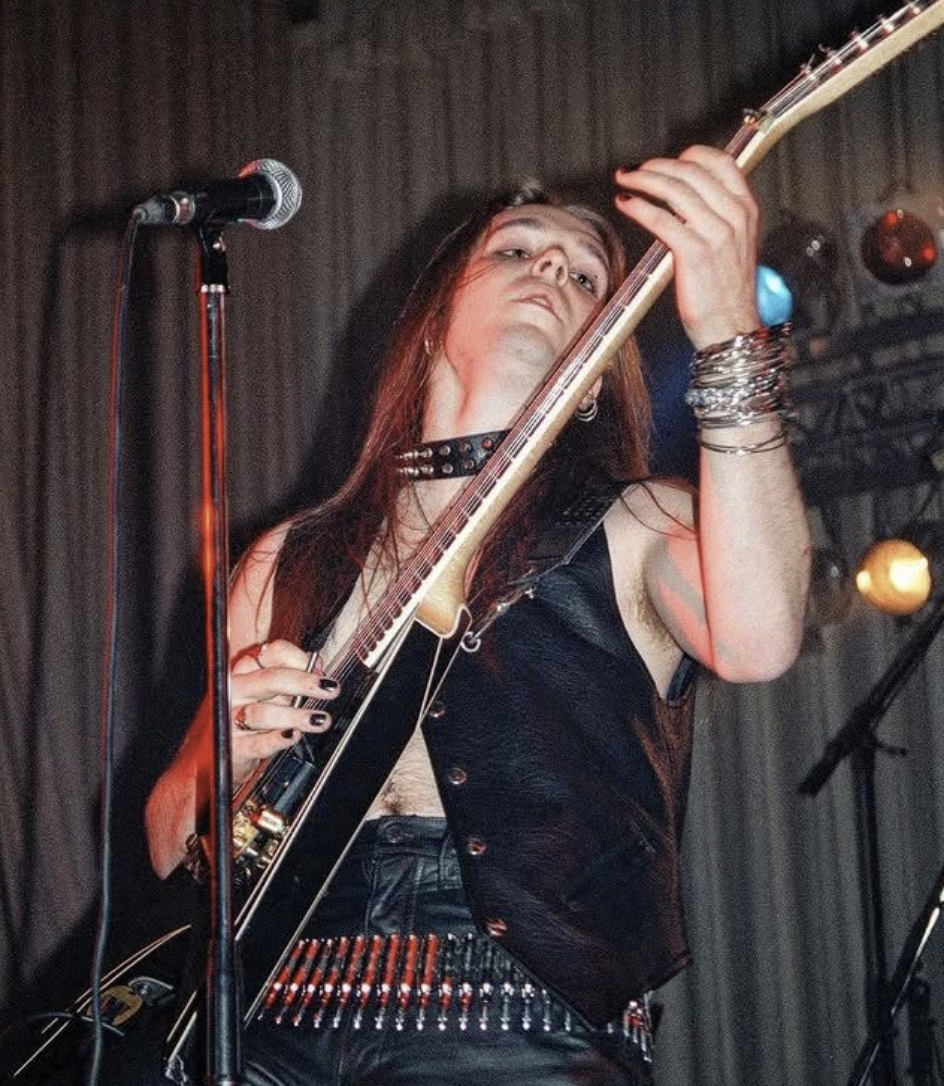
Another member of Dimmu Borgir, keyboardist Kimberly Goss, would be equally enamored with Laiho’s performance, so much so that the two began dating shortly after the show. Alexi would also join Goss’ side project called Sinergy featuring her on lead vocals and the legendary Jesper Strömblad of In Flames on guitar. After touring Europe with Dimmu Borgir again the next year, Laiho and his Bodom bandmates recorded their sophomore effort, the godly Hatebreeder, in late 1998. Following the initial tracking of Hatebreeder, Laiho joined his girlfriend Goss in Gothenburg, Sweden to begin work on the debut album from Sinergy, Beware the Heavens.
During the recording, however, there would be another incident that was indicative of the then 19-year old’s state of mind. One night during his stay, he and Kim went out drinking. His beau wanted to head home while Alexi was keen on staying out a bit longer with a local band he had befriended. While he doesn’t specify what occurred, Laiho wrote that something happened that made him run to Kim’s apartment, lock himself in the bathroom, and wash all the pills he could find in there down with whiskey. According to his account of these events, Alexi “wanted to end it all because [he] felt [he] couldn’t stand anything anymore.”
When he came to, he was at Strömblad’s place under the care of his girlfriend who happened to be a nurse, with no knowledge of how he’d gotten there. Upon returning to Finland after the suicide attempt, Laiho was admitted to a psych ward but became increasingly despondent upon being released. He relapsed into self-mutilation, experimenting with different blades and nearly killed himself again had Alexander Kuoppala, his bandmate at the time, not shown up to check in on him. Upon seeing the state Alexi was in, Kuoppala, whom Alexi referred to as an older brother figure in the early days of the band as he was five years his senior, rushed him to the hospital and essentially saved his life again.
The episode was far from over, however, as after being released from the hospital Laiho began seeing a psychiatrist, following through on a promise he had made to his guitarist. Alexi said the sessions went well until he was hit with a massive anxiety attack that led him to be rushed back to the hospital to the psych ward again. He described himself as being on the edge of psychosis and then subsequently “pumped full of meds” and “slept for several straight days without waking up.”
Though his telling of this episode ends here, Laiho admits to relapses with self-mutilation throughout the years in his autobiography. Without speculating as to the root cause, it’s interesting to note that at this point as his career is seemingly taking off, Alexi is experiencing depths of depression and anxiety that he’s never felt before, with nearly fatal results.
"Sinking down in the ocean of severe emotions
Grab a bottle to drink up the pain-relieving potion" – “Follow the Reaper,” Follow the Reaper (2000)
For as much as they were known for their musical acumen, Children of Bodom were almost equally known for their hard-partying reputation. It’s evident from their live performances, recordings of their studio sessions, and any home recorded footage of the group that eventually made onto 2006’s Chaos Ridden Years, that these guys liked to have a good time to put it mildly. And the results are what you would expect from a group of young men access to free beer and booze in a rock and roll setting.
To put it into perspective, consider this response Alexi gave when asked about how long it would take the band to finish a given amount of booze when asked by a fan in 2015:

But for a band that routinely toured for 10 months out of the year, it’s not controversial to think this type of behavior every night could prove to take its toll as the years wear on. Laiho would often return home from tour and sleep for days on end. For someone who had begun using alcohol as a solution to his problems before the band found success, it might cause one to reflect on how much of it was living the rock and roll lifestyle and how much of it was really self-medication.
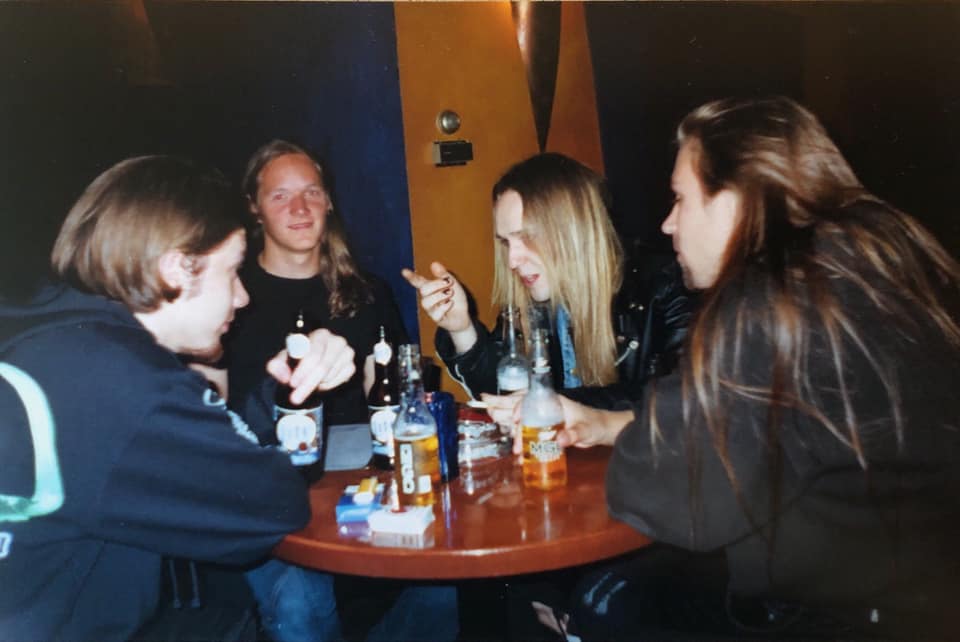
Janne Wirman, the virtuoso keyboardist in Children of Bodom who played the dazzling keyboard equivalents to Laiho’s solos, and knew the frontman better than most, had this to say about his dear friend and the reasons for his penchant for drinking:
So, I had probably been playing in the same band with Alexi and been very close friends with him -for about ten years until I realized that he is shy and insecure about himself. He pulled off that rock star role so strongly, that I believed the whole thing for a very long time. Until one day, when he was completely himself, somewhere at a rehearsal space or something, he lit candles and spoke about very sensitive matters. I realized like, damn, Alexi is actually quite a shy guy. But the thing is, it's not easy to figure out. I believe that he didn't willingly show that side of himself to many people. I know now, that Alexi the rock star, who was in front of the audience and in all the interviews, when we met fans and so on, it was just a role that you put on, like now I'm this guy. And then in everyday life among us, he was the funny guy, but then at some point, and indeed this is strange, but even though I had known Alexi for a really long time, only then did I realize that Alexi is actually quite shy and quite uncertain about himself in some situations. This is a typical thing for a Finnish man, and it then leads to alcoholism. And then I kind of noticed that he always had to take some liquid courage before every fan encounter, before every interview, before every situation where he had to get that rock star role on. Then this phase started, where he always had like a bottle of booze in his bag or pocket and he always needed to have a drink to get some courage. – YLE: The World’s Best Alexi Laiho Podcast
Janne’s quote paints a picture far from the larger than life stage persona Alexi exuded throughout his career, and points further to the idea that he needed to, or believed he needed to, drink in order to get into that mindset. Whether it was a lack of confidence in himself, to overcome his shy demeanor, or to play along with the rock and roll cliché, the bottom line is that Laiho clearly thought alcohol was necessary for him to continue playing the rock star role he had dreamed of for so long.
“Disclosure, self loathing, this time you've gone too far
Or could it be, my nemesis, that you are me?
Enemy, take a one good look at me.
Eradicate what you'll always be
Your tainted flesh, polluted soul through a mirror I behold.
Throw a punch, shards bleed on the floor
Tearing me apart but I don't care anymore.
Should I regret or ask myself: ARE YOU DEAD YET?” – “Are You Dead Yet?,” Are You Dead Yet? (2005)
In what should have been the proudest moment of his career to that point, Alexi showed up to the photoshoot for the Guitar World cover in 2005 with Steve Vai and Zakk Wylde with a cast on his right arm and a black eye. He had sustained the injuries when while out drinking, he decided to climb on to the top of a car and flipped and fell on the concrete. Nearly two years later in early 2007, Alexi went bowling with some friends and drunkenly fell into the gutter of the lane, sustaining a shoulder injury that would cause Children of Bodom to cancel scheduled tour dates. His bandmates would intervene the next year during a tour with Slipknot during which Alexi’s drinking was especially concerning, and he complied with their request to cut back while on the road.
A year later in 2009, Alexi would fall from the top bunk on the band’s tour bus while traveling through the United States. He would land on the same shoulder and collarbone which had fallen victim to the lane gutter of the bowling alley, causing pain to radiate down to his hip. After reluctantly seeing a doctor two tour stops later, he was prescribed painkillers that allowed him to continue the tour until a stop at Roseland Ballroom. Three songs into the set, Laiho could no longer tolerate the pain, threw his guitar, and stormed off stage to vomit blood in the dressing room. The tour’s final five dates were cancelled.
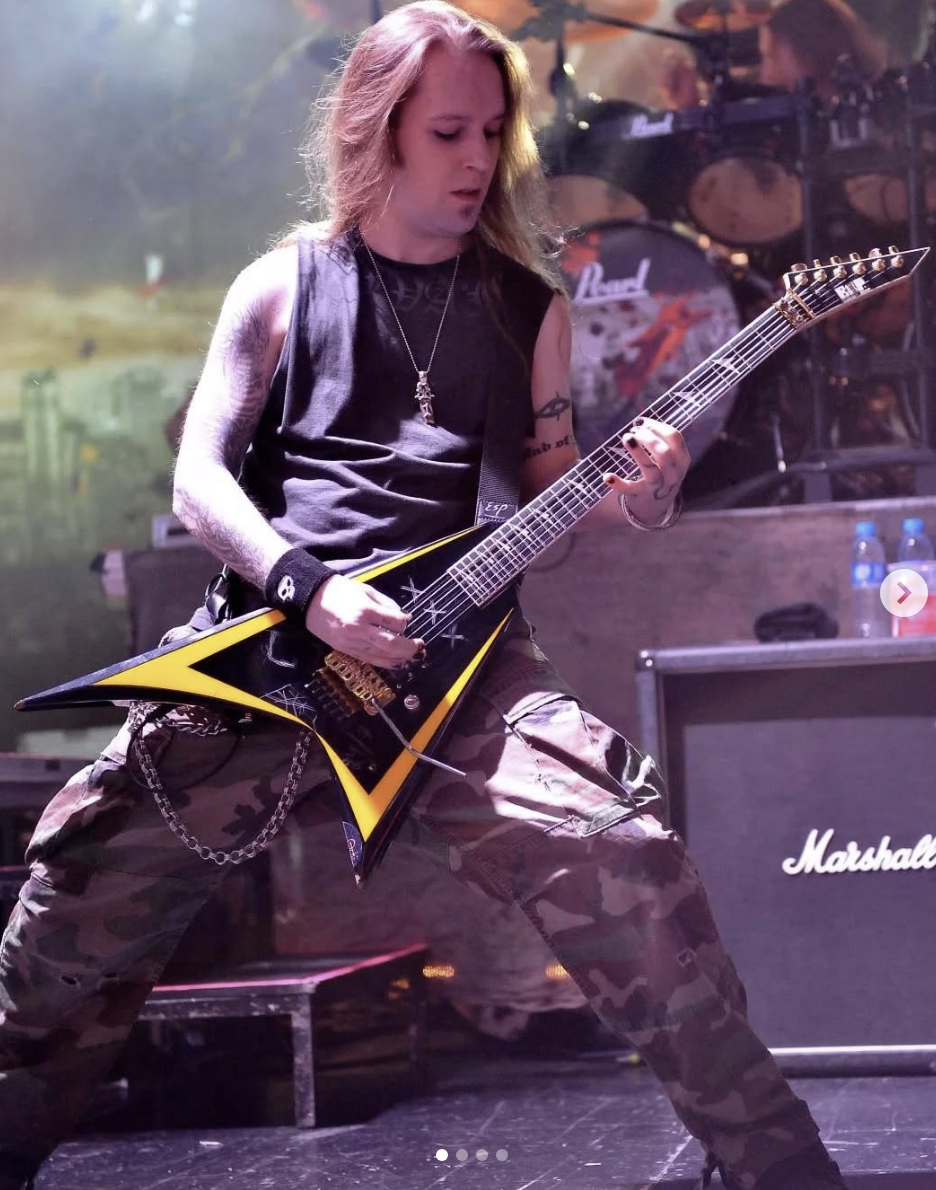
A year or so later in 2011, after drinking heavily, Alexi experienced extreme stomach pain and was vomiting blood for nine hours before being rushed to the emergency room in Los Angeles. This experience seemed to be an eye opener, as Laiho reflected on it by saying:
This was the first time the consequences of my drinking really scared the shit out of me. I made a conscious decision to take immediate action. The crazy booze binges that had been par for the course for me for years were over. And not only that, I started looking at my entire alcohol consumption with a critical eye.
Further, in an interview with Revolver when asked about the whole hospitalization ordeal, Alexi said:
It wasn't just that four months, but years of crazy shit. I was having fun, but then all of a sudden I realized that instead of having fun, I was medicating with the booze, and that's not good.
Despite all of these injuries and ailments, most of which can be attributed to alcohol in some way, Laiho said in the same interview that he has never considered rehab. Both in the Revolver interview and his autobiography, he expressed that he does not consider himself to be someone who is physically addicted to anything, and moreso that the inability to quit is a sign of weakness. Whether that’s rock star Alexi speaking, or the shy, introspective man Janne Wirman spoke of above, is unknown.
In that same Revolver interview, Alexi was asked about the lead single from 2011’s Reckless Relentless Forever titled “Not My Funeral,” to which he responded:
It sounds pretty dark but someone who used to be pretty close to me told me, 'Dude, you're going to die,' that they had got a professional opinion and it was that I was going to die in the next 10 years, and that got me so fucking pissed off. I don't need someone who's never met me saying that.
“I just need my fix, I'm dying so break out the bottle and stop crying; and the calm washes over
My soul drying my tears
Under the grass and clover
A new sense of hope appears” – “Under Grass and Clover,” Hexed (2019)
Though his view on addiction and going to rehab did not waver as the years went on, Alexi did go through extended stretches of sobriety according to his bandmates. Roope Latvala, who joined the band after Kuoppala’s exit and famously played lead guitar in Finnish band Stone who Alexi revered, said Laiho was not the “hedonistic” party animal that the press sometimes made him out to be. The problem in Roope’s eyes was that Laiho binged while on tour, did not take care of himself physically nor eat properly when he ate at all, and rarely left the hotel room when the band was on the road. He would be hospitalized again in 2012 in Europe due to stomach ulcers, as well as the next year in 2013 in Nashville, leading to more speculation in the press of his dangerous relationship with alcohol.
According to his bandmates accounts of 2015 surrounding the release of I Worship Chaos, the name of the album being a reference to the frontman’s distaste for silence, boredom, and the thoughts in his own head, Laiho seemed to be in a good place. The next year, the band was still touring on its usual circuit throughout the world promoting the new record. Sometime during 2016 though, Alexi would have a conversation about a decision he made with Janne Wirman that would sharply change the direction of both the future of Children of Bodom and Laiho’s life in general.
Alexi's downfall started in 2016. I don't know what caused him to do that. He told me but didn't tell anyone else in the band — he made sure no one else was in the room — and told me, 'Dude, from now on, I'm going to drink until I die.' I said, 'Fuck, man. You can't say that to me.' He said it another time in 2018. I knew that was what he was doing — he said he wouldn't take any help for his medical issues. He was going to keep drinking. That's what he did, which is fucking crazy.
His behavior became more erratic towards other members of the band. In 2018, claiming he was bankrupt, he resigned from the band despite already receiving an advance from their next, unfinished record. He ultimately relented on quitting, and agreed to finish the album and tour cycle.
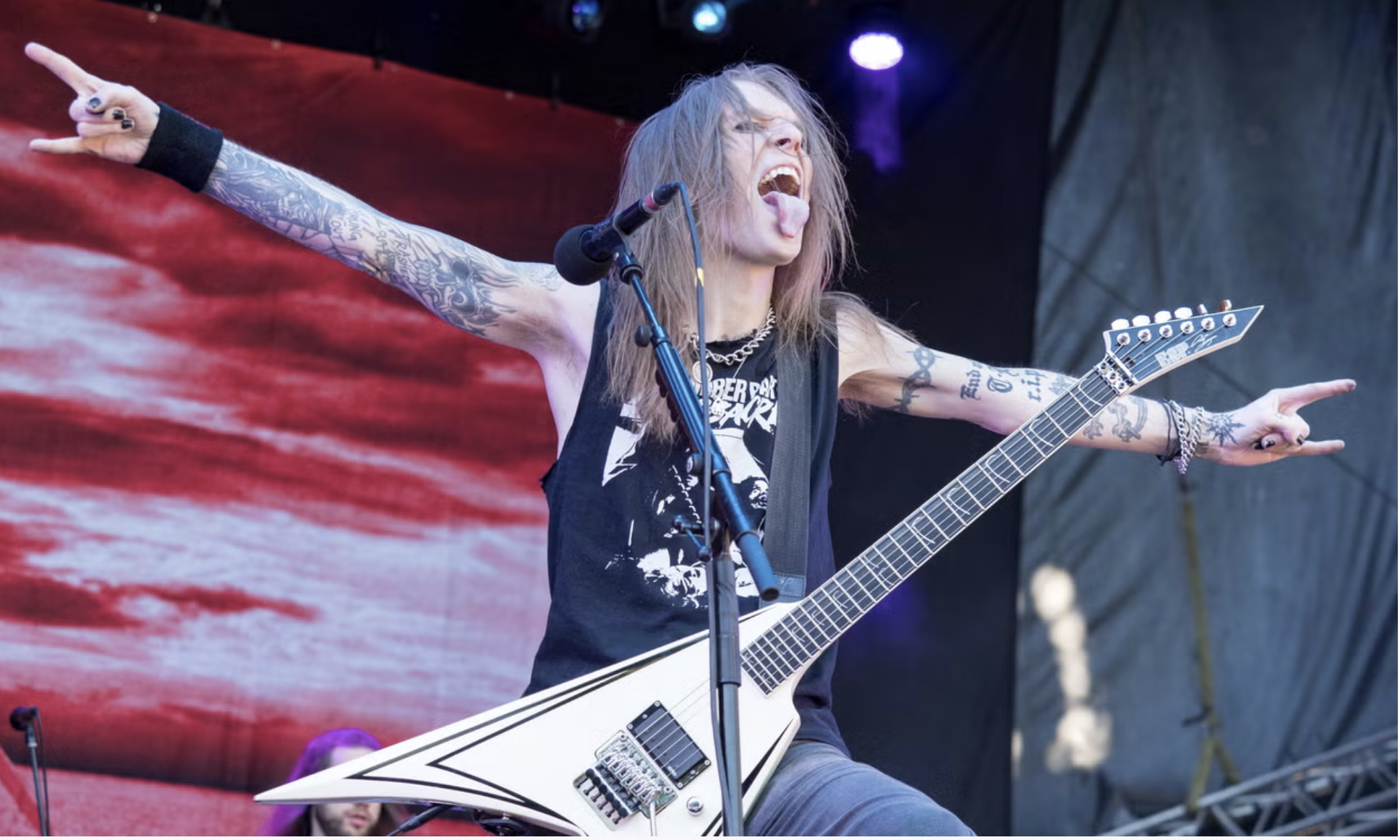
The situation continued to deteriorate on the tour for their next, and final album, Hexed. After concerns were raised about his weight and health during the U.S. leg, their tour manager demanded Laiho go to rehab. He refused but was seen by a doctor and diagnosed with diabetes, which seemed to be the panacea Laiho sought to explain away his medical ailments. While on tour, his bandmates recall that Alexi was struggling to play the guitar on stage and was barely practicing, which had been routine throughout every tour the band had done previously. His drinking was also at an all-time high, alongside the use of painkillers like codeine and valium. His long time friend and drummer Jaska spoke of that tour in these terms:
I told Alexi that you don't usually drink starting at breakfast before a gig, and now you don't even warm up with the guitar before going on stage like you always do.
To make matters worse, between legs of the tour, Laiho had filed a patent to use the name Children of Bodom, which was licensed under the group’s LLC through which all four major members split revenue equally. This raised even more alarms within the group, as Alexi would send drunken emails threatening to fire members of the band because they dared to question him and essentially care for his well-being.
At the end of the tour, his comrades had finally seen enough and tried to help as best they could. Another long time friend and bandmate, bassist Henkka Seppälä, described the dire situation around the Hexed tour like this:
We had a kind of intervention at the end of the [Hexed] tour, and Alexi got so mad at us. We told him things couldn’t go on like that. He was in such bad shape that our tour manager had to have every city’s morgue number, just in case we woke up and found him dead in his bunk. 2019 was such a shitshow.
Laiho did eventually apologize for his behavior and sobered up for the last gigs of the tour in Russia. Wirman recounts, “His hands were shaking for two days, but the gigs in Moscow and St. Petersburg went pretty well.”
Following everything they had been through, the other three members agreed to buy Alexi out of his share of the LLC, which he had wanted two years prior, to put the matter to rest. It was announced on November 1, 2019 that the band would play their finals shows together in their native Finland, concluding on December 15, 2019 at Helsinki Ice Hall, a place where Laiho saw many of his favorite bands growing up. The statement released read:
After almost 25 years with Bodom, thousands of shows & 10 albums, Henkka, Janne and Jaska have decided to step back and change direction within their lives. Alexi and Daniel will have further announcements about their plans to keep creating new music in the future.
In 2022, the three band members mentioned above would come out and tell their side of the story in Helsingin Sanomat, where much of the information contained above was revealed. The main reason for their leaving was Alexi’s substance abuse, and not their commitments to their family as had previously been implied. The final show was released as a live album in 2023 through Spinefarm, the label that signed the group for Something Wild, as A Chapter Called Children of Bodom.
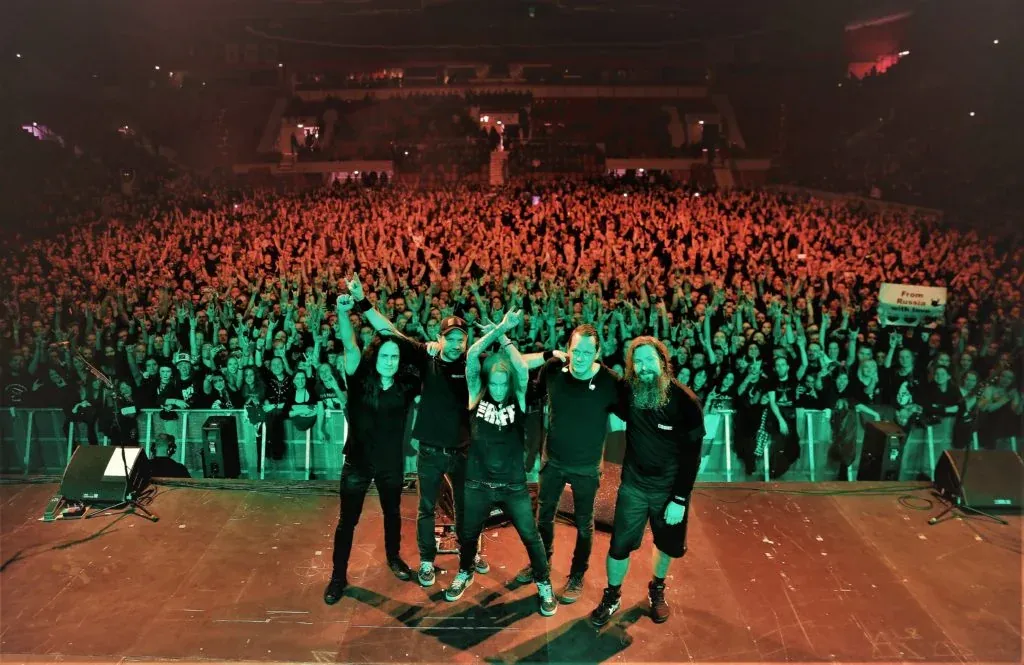
“I'm walking towards dead end
I'm walking all alone
Two steps behind insanity
There's no starlight guiding my way through
This downward death row
Soon will be the time I have to go” – “Towards Dead End,” Hatebreeder (1999)
Alexi would soldier on with a new band called Bodom After Midnight, recruiting guitarist Daniel Freyberg who played alongside him for the last few years of Children of Bodom, Mitja Toivonen on bass, and Waltteri Väyrynen on drums. The band worked on new material and eventually released an EP titled Paint the Sky With Blood, which included two original songs and a Dissection cover.
Though his new band said he was in good spirits and looked healthy during their sessions together, Laiho’s condition continued to worsen. His sister Anna, his Australian wife Kelli Wright-Laiho, and a handful of close friends tried to get Alexi professional help in the fall of 2020, but he refused as he had in the past. Someone close to the situation said that anything that could be done, was done to help him. Alexi Laiho died on December 29, 2020 from alcohol-induced degeneration of the liver and pancreas connective tissue and had a cocktail of painkillers, opioids and insomnia medication in his system at the time of his death. His death was announced to the world on January 4, 2021 which brought mourning and prayers from members of the metal community worldwide.
His sister Anna summed up her brother perhaps better than anyone else could:
At heart, he was a warm and caring person, always ready to help others. But he had his demons, and he wanted to fight those alone. He wanted to make his own choices. For better or worse.
Those closest to Alexi Laiho might have a better idea of what caused this brilliant guitarist and composer to make the decisions he made during his life. As a fan looking in from the outside, I can only make educated guesses based on the evidence I’ve laid out above. By no means is this meant to speculate or disrespect anything about the man. I was a fan of his from the first time I heard the introduction to “Follow the Reaper” and continue to be to this day, which has led me to search for these answers. Everything that follows from my perspective is done with appreciation and respect for the contributions he’s made to the world of music for me and so many other people around the globe.
The incident involving his stalkers that made him seek shelter outside of Espoo no doubt led him to cope in ways that were unhealthy. It’s possible that this is where his “demons” began to take shape, but it’s also feasible that they were always there and exacerbated by that experience. Those habits he developed in response to that event would be repeated throughout his adult life.
The young age at which he achieved relative stardom is also notable for a few reasons. Alexi was described by those who knew him best as a shy, introspective guy who at times was unsure of himself. At such a young age, it’s not unreasonable to think that some of the anxiety he experienced was due to the pressure and stress that he put on himself to perform and deliver given the early age he dedicated himself to one singular goal. His insistence on playing through pain regardless how intolerable, through the use of painkillers and other means of assistance without solving the original problem, was likely guided by this desire as well.
Consider also that with the modest stardom he achieved with Something Wild, he was being pulled in many directions already. That includes the pressure to build on the success of his debut album, being asked to collaborate with Sinergy with many established metal musicians, and his relationship with Kimberly Goss from Dimmu Borgir. While this should have been an exciting while challenging time for him, the situation ultimately ended up with him attempting suicide once and a near fatal self-harm incident that he only survived through a bandmate miraculously showing up at the exact right time.
Though the self-mutilation would subside over the years, I would argue that Laiho’s self-harm shifted techniques as he fell deeper into his alcoholism. In that Revolver interview from 2011, he reflected on his use of booze to self-medicate. Wirman’s comments regarding his use of alcohol to get into the rock star zone are also equally illuminating. Was it part of the rock and roll persona he wanted to craft for himself, or was it necessary for him to do in order to overcome to shyness and insecurity he felt about himself to get on stage night after night and deliver? It’s possible that he thought it was the only way he could continue to live the dream that he had wanted since he was four years old listening to “Money for Nothin’” by Dire Straits.
Alexi was also very opinionated on certain matters throughout his life. He believed any guy playing in a metal band needed to have long hair and frowned upon his fellow members shedding their locks. He thought English was the only proper language for a metal band to write their lyrics in. He also thought physical addictions were a sign of weakness and refused to get help for his problems despite people that loved him dearly begging him to seek it.
Most of all, I look to the lyrics Alexi wrote in his songs from early on. If you noticed, every section of his story that I’ve detailed has started with an excerpt of lyrics that relates to the events that transpired. It’s evident from examining his words, even though he downplayed their importance, that Alexi’s inner most thoughts reflected the thoughts he had about himself. Throughout his career, he spoke about channeling all of his negative emotions into his music as a way of dealing with them, but there’s a heartbreaking level of self-awareness and honesty in his words. Whether it’s “Are You Dead Yet?” reflecting on the embarrassment he’s felt after another drunken episode, begging for death as a release from alcohol withdrawal in “Under Grass and Clover,” or the self-harm and suicide references in “Bed of Razors,” “Downfall,” or “Towards Dead End,” you can’t help but feel that Alexi was on this road from very early on as your heart breaks for him.
What I’m left with is an incredible gratitude for the music Alexi left this world and a profound sadness that he felt he could not cope with life in any other way but to slowly but surely destroy himself. Whether you are a fan of Children of Bodom or not, when you watch Alexi play guitar, and you listen to the brilliant compositions he wrote, you can’t help but feel that you witnessed something that was once-in-a-lifetime great. I, and fans around the world, just wish that lifetime was a little bit longer.
Video credit: CircleOfBeliefs (YouTube).
To borrow a phrase that Alexi used so much he ended up getting it tattooed on his body: end of fuckin’ story.
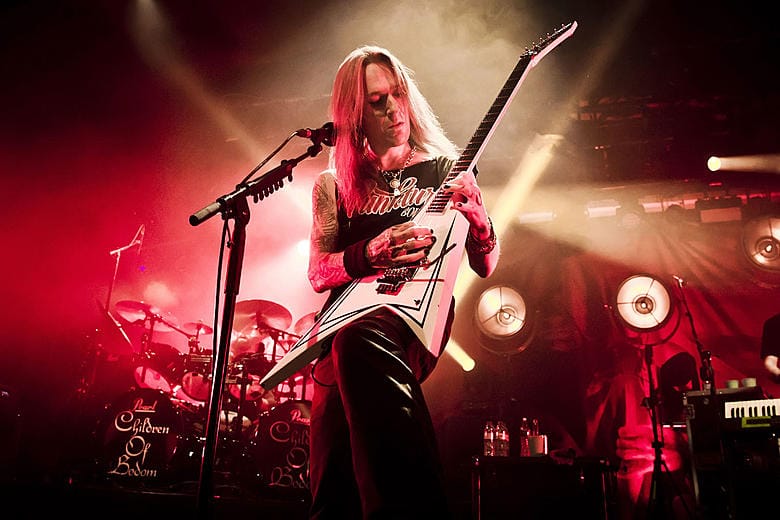
Chaos, Control & Guitar written by Petri Silas with Alexi, YLE's podcast The World's Best Alexi Laiho (which I listened to in Finnish with English subtitles), and several internet resources and interviews were integral in writing this piece. They are credited to the sources they originally appeared in.
A bonus playlist so you can enjoy Alexi's generational playing and sense of humor:

